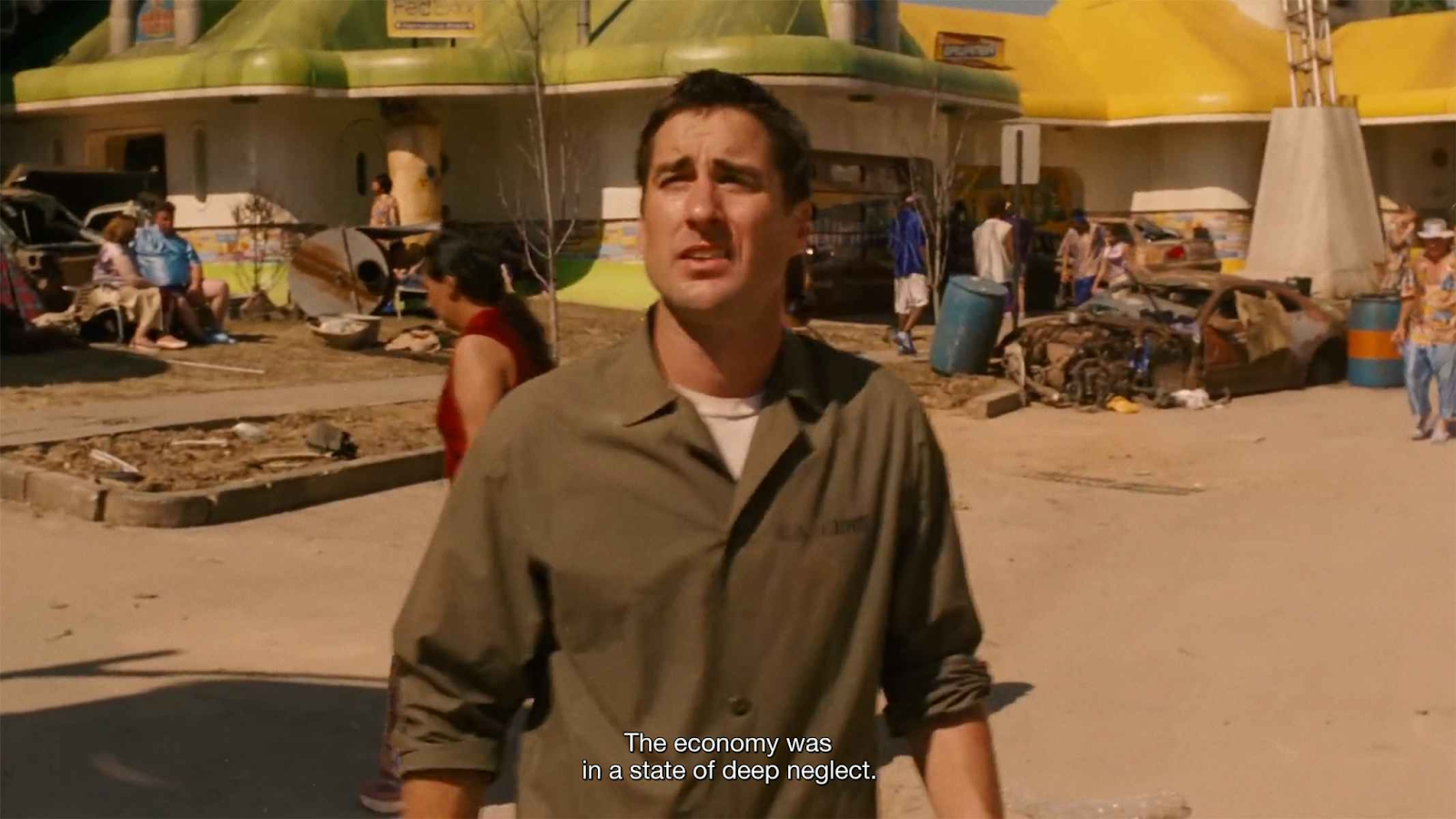Continue Reading
Biggest Finance Newsletter for Women
Join 200,000 other people interested in money, power, culture, and class.
Subscribe
Every once in a while, a series of mundane events accumulates to produce a moment of out-of-body, blistering clarity. “Clarity” is not a mental state I’ve experienced much recently, but on my last day in California, it arrived unannounced while I idled in a Safeway parking lot.
Earlier that morning, I had been speaking with the moving team’s foreman in our cardboard-filled kitchen. “How much do you think they’re asking for this house?” he wondered aloud, referring to my out-of-state landlord’s decision to sell. I told him it was a low seven-figure sum that still seemed a little high to me, but what did I know?
“I went through a nasty divorce 11 years ago,” he volunteered, “and let my wife keep the house.” I nodded silently, unsure where this was headed. “Then I bought a six-bedroom foreclosure from the bank for $187,000. I put $100,000 down. My monthly payment is only $2,300.”
Despite having spent enough time dicking around with mortgage calculators to realize immediately this math was nonsensical (a 30-year fixed-rate mortgage in 2014 averaged about 4%, which would put payments on an $87,000 loan at around $600), I decided against pursuing a new line of questioning. 2014 saw the lowest foreclosure rates since 2006, I learned later, after the Great Financial Crisis had finally finished flushing around 10 million people out of their homes. Without prompting, he added, “I did the eviction myself,” with a note of what sounded like pride.
A few hours later, the Berkshire Hathaway real estate agent arrived in a silver Maserati for a move-out walkthrough. After I finished showing him where the carpet had worn thin and which drawers in the kitchen frequently jammed, we stood in the driveway talking about a prospective buyer eager to tour the house later that day.
>
“If even this wealthy beneficiary of rapid real estate appreciation is defending the hypothetical bad attitudes of the working class, things must really be bleak.”
As we chatted, a silver-haired man wearing AirPods approached us from behind the mass of boxes. I scanned his face for signs of an impending lecture about the moving truck parked on the street, but it turned out he thought we were moving in. He introduced himself and explained he had recently relocated from Newport Beach, a town where the median home costs around $3.5 million. He said he loved the Sacramento area. “Everyone’s so nice,” he gushed. “Even the kids who work at Chick-fil-A and Starbucks seem happy all the time. Back in Orange County, everyone who works at Starbucks seems angry you’re there.”
I braced myself for the rich Southern Californian Baby Boomer and Maserati-driving Berkshire Hathaway real estate agent to commiserate with one another over the lackluster work ethic of Kids These Days, but Maserati Man threw a welcome curveball: “It’s because the cost of living is so high,” he said matter-of-factly. “They’re probably tired, working multiple jobs, and absolutely miserable trying to make ends meet.” Stunned into silence by this unlikely demonstration of class consciousness, I turned to my old/new neighbor for his rebuttal. Thoughts? I wanted to ask.
He smiled and shrugged, and shortly thereafter received a call and wandered down the driveway with a wave and little explanation. I turned back to face the agent, titillated by this turn of events. If even this wealthy beneficiary of rapid real estate appreciation is defending the hypothetical bad attitudes of the working class, things must really be bleak, I thought.
I sensed that whatever polite shroud of distanced small talk that separated us before had evaporated; we were no longer method-acting as the Diligent Renter and Knowledgeable Real Estate Professional. Our conversation quickly turned to the economy, how disparities are so apparent now, how he remembered when the $2,500 rents in his neighborhood were $500 in 2005. I detected a weariness in his eyes that I hadn’t noticed previously when we were discussing the particulars of waterfront property values. The mask of normalcy slipped once we recognized in each other the same deep well of unease about the future.
Lately, things have felt tonally reminiscent of early 2021, when I spent my days making Powerpoint presentations about user experience updates while daily breaking news alerts reported the pandemic’s rising death toll. In Dallas, where I lived at the time, a cold snap that proved too much for the deregulated Texas energy grid plunged large swaths of the state into frozen darkness for days. On the Teams calls we held anyway using hot spots and portable chargers, it often seemed like we were side-eyeing each other nervously, searching for signs of hidden panic as we continued to play our instruments on a ship we feared was sinking.

The financial mood in the US ever since the phrase “mortgage-backed security” was uttered.
Back in the driveway, the agent and I briefly discussed our proposed solutions (his: more government subsidies for aspiring homeowners; mine: disconnecting housing from speculative markets) before parting ways. I drove to Safeway.
An hour later, distracted by a parade of logistics as I climbed back into my car with a bag of sour candies and last-minute gifts for our neighbors, I failed to activate my standard podcast routine. Instead, the default FM country station—one I’d never bothered to change—crackled to life in the middle of a debt consolidation ad.
“You’re drowning in debt!” a self-assured voice boomed merrily as I backed out of my spot, “and we can help!” I reached for the gearshift as he continued making his pitch over upbeat Muzak. “For a limited time, you could qualify for up to $10,000 in debt relief, with no upfront fees.” At this, my hand froze and I stared blankly out the windshield, trapped in an abrupt trance by the sudden realization that something had gone very wrong—and had been wrong for a long time.
The pedestrian events of the day—the moving man’s mathematically questionable foreclosure coup, the Berkshire Hathaway agent’s cursory understanding of the plight of the millennial underclass, the oblivious ex-Newport Beach dad who preferred his baristas cheery and nonunionized, the chipper debt consolidation ad—coalesced into a cohesive picture of an empire in decline. I thought of Joe Bauers in Idiocracy, waking up in the year 2505 and being told repeatedly by the corporate-captured denizens of the United States of America Brought to You by American Express that “Brawndo’s got what plants crave!” while harvest after harvest withers.

Like most people who pay attention to the economy and financial trends for a living, I had spent the week spinning my wheels over the distractions du jour—tariffs, historic one-day market losses, divining a strategy from the word “yippy.” But it was as if breaking the fourth wall with the real estate agent—an unexpected, shared acknowledgment of peril—weakened the façade of normalcy that shields most of my interactions these days. This brief lapse meant the commonplace “drowning in debt” radio spot—which assumed, rightly, that its median listener was struggling under the weight of thousands, if not tens of thousands, in debt—managed to bypass the part of my brain that had long ago acclimatized to this state of affairs.
In the last week, it became commonplace to suggest any attempt to make sense of the economic turbulence was about as worthwhile as any other parlor game. To rationalize or infer strategy was, basically, a fool’s errand: The policies weren’t just poorly implemented; they were alternately “mindless,” self-contradictory, or just plain “stupid.” But that assumes we aren’t constantly engaged in this sort of sanity-washing for the status quo. We might be so conditioned to lifestyles that require vast levels of personal indebtedness to sustain that we don’t often notice—the median non-mortgage debt in the US is around $25,000—but every once in a while, the naked absurdity of such an arrangement comes sharply into focus.
On a recent episode of Scott Galloway’s Prof G Markets, Scott and his producer Ed sat down to hash out what might be coming after the latest wild week of announcements. To do this, they invited Gary Stevenson, the former British trader known for his sober, no-bullshit commentary. As Gary tells it, he worked as a trader during the Great Financial Crisis and saw the rebound differently than most of his peers. In the aftermath, he says, the other financiers kept assuming—year after year—that things would turn around soon. When they kept getting it wrong, they were confused: Why weren’t people spending money? Why wasn’t the stimulant stimulating anything?
Since he came from a working-class background, he decided to ask the friends he grew up with in east London—none of whom became wealthy traders like he did—the question that stumped his colleagues: Why aren’t you spending money? He learned the answer was simple: They didn’t really have any extra money to spend. He began aligning trades with his prediction that the events of 2008 were going to set global wealth inequality on a sharply rising path, and that real economic growth would become harder and harder to come by. Today, Gary seems aware of the irony of earning millions each year betting on collapse.
>
“He learned the answer was simple: They didn’t really have any extra money to spend.”
Valiantly searching for an actionable takeaway at the end of the interview, Ed asks Gary what advice he has for young men who feel increasingly disillusioned by their job prospects and earning potential. “For people who are listening to this and want to protect themselves at the individual level,” he begins, acknowledging that most people still want to become wealthy despite the inconvenient trends Gary just outlined, “what’s your advice for dealing with this new world?” Gary laughs and restates the question: “If the Titanic’s going down, what do you do at an individual level?”
After he rattled off the standard response (work hard, be clever, invest a lot), he delivered the most honest answer I’ve heard in such a profoundly uncertain moment. The truth is, he says, most people listening to their conversation will probably never “get rich” without systemic reform.
“But that doesn’t mean your life is over,” he adds pointedly. “There are important things you can achieve for yourself, your family, and the people you care about.” In other words, you don’t need to be a wealthy person to live with dignity and meaning; you can choose to construct your life around something other than the ruthless pursuit of social mobility. In a global economy where the rules seem to change by the week, this sentiment was like a long exhale after forgetting you’d been holding your breath.
April 14, 2025
Looking for something?
Search all how-to, essays, and podcast episodes.
Explore
While I love diving into investing- and tax law-related data, I am not a financial professional. This is not financial advice, investing advice, or tax advice. The information on this website is for informational and recreational purposes only. Investment products discussed (ETFs, index funds, etc.) are for illustrative purposes only. It is not a recommendation to buy, sell, or otherwise transact in any of the products mentioned. Do your own due diligence. Past performance does not guarantee future returns.
Money with Katie, LLC.
Terms & Conditions | Privacy Policy
This Site Was Built by Brand Good Time



